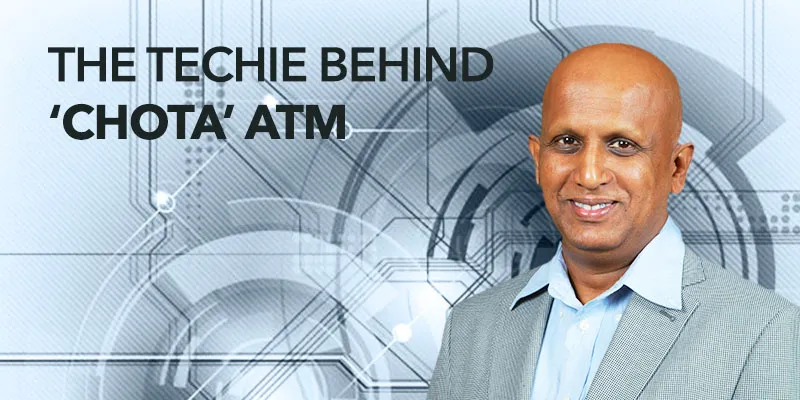[Techie Tuesdays] Meet the techie behind the 'Chota ATM'
Bhaktha Keshavachar, a hardware veteran from Intel, is the Co-founder and CTO of Ezetap, a mobile POS company. The company manufactures a device which enables any smartphone or tablet to become a full-fledged ‘Point-of-Sale’ terminal by the adding the Ezetap Card-Reader. His journey is nothing less than a dreamy tale spanning decades.
Born and brought up in Bangalore during the time when there were more gardens in the city than IT companies, Bhaktha's tryst with technology began during a summer camp organized by Vishveshwarya Technological Museum, where he first discovered electronic concepts and started a lifelong relationship with them.
One of first projects that Bhaktha did there was to build a regulator to control brightness of light. At another instance, during a summer camp, he built an audio amplifier. He prefers to call himself a hardware hacker. Bhaktha recalls the time when he used to cycle to SP Road to buy electronic parts for his project. Over 20 years while building Ezetap, Bhaktha says he could sense the same excitement going around SP Road. The only thing which changed this time was that he was in a car instead of the riding around in a bicycle.

Bhaktha had his early schooling in a government school and then went on to join St. Joseph’s College for his intermediate education. He was among the first batch which gave the Karnataka Common Entrance Test and then proceeded to join UVCE (University Vishveshwarya College of Engineering). His parents wanted him to become a doctor, but his resolve to be an engineer was stronger. After completing his engineering in Electronics and Communications, Bhaktha joined BPL, which used to be a very big name back then. A communications guy to the core, Bhakta was responsible for designing the fax modems at BPL. Looking towards better prospects, Bhaktha went to the US to pursue his Masters degree at Arizona State University in wireless communication.
For most part of his life, Bhaktha has been lucky to work on technologies of the future. Immediately after graduating from Arizona State University, Bhaktha started working on the GSM Phones at Sharp Technologies. This was during a time when cell phones had still not become commonplace even in USA. Post his stint at Sharp Technologies, Bhaktha joined Intel.
Bhaktha never knew that his association with Intel would prove to be a long one where he would play a significant part in designing the core on which modern civilization runs. He was working on the micro architecture of Intel processors for computers. At Intel, he worked alongside people who had seen the company grow to become a world leader, and at the same time he was also mentoring people and helping them get ready for the challenge.
Related read - SBI ties up with Ezetap to launch ‘Chota ATM’ for INR 499
Bhaktha recalls an instance at Intel when they were working on a low-cost embedded chip, which had two processors, but there was some problem in synchronization and it took them weeks to figure out a solution. They had to work day and night, and check each clock cycle to figure out the bug, and after a couple of weeks they found the bug which was causing a buffer corruption issue. Once they found it, the solution was just 10 lines of code. "It was a very nasty bug," recalls Bhaktha. Apart from low level programming, Bhaktha’s exposure to software was limited to sitting with compiler engineers at Intel.
After spending a decade at Intel, Bhaktha came to India with a desire to start up. He started Antargata Infotech in 2009. The company was focused on hardware level security which was Bhaktha's forte. However, being a technical guy, Bhaktha found it difficult to market and was more engrossed with the technical aspects of the product. One day when Bhaktha was visiting Sanjay Swamy (Co-founder, Ezetap), they started discussing about the problems in payments space and how they could solve it. The discussion lasted for four hours by the end of which Bhaktha decided to join Ezetap as Co-founder and CTO.
Bhaktha helped Ezetap build the engineering team from scratch and trained people to become superstars. Being an avid hardware hacker, Bhaktha believes in doing things quick and dirty. They built the prototype of the payment device using an Arduino board. To take the maker philosophy forward, he brought a 3D printer using which people can test the ideas, and the time to execute can become real quick.
Looking back at his journey from a Sinclair Spectrum ZX in the 80s to the world of Facebook where even a two-year-old plays ‘Temple Run’, Bhaktha says the biggest surprise is not Facebook but the technologies that power the Ubers and Olas, which are the integration of everything. “You don't even have to call the driver and he will be at your service.”
For the young generation, Bhaktha's chief life lessons include -
1) Never get tired of learning
2) Always be curious; never let your curiosity die
3) Having a maker mentality helps.


![[Techie Tuesdays] Meet the techie behind the 'Chota ATM'](https://images.yourstory.com/cs/wordpress/2014/11/yourstory_ChotaATM-1.jpg?mode=crop&crop=faces&ar=2%3A1&format=auto&w=1920&q=75)
